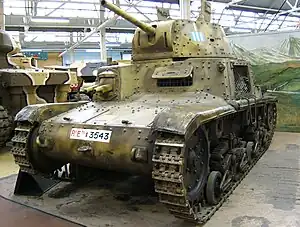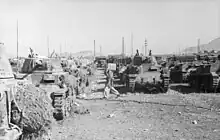M14/41 tank
The M 14/41 was a four-crew medium tank that served from 1941 in the Royal Italian Army. The official Italian designation was Carro Armato M 14/41. The tank was first employed in the North African Campaign where its shortcomings quickly became apparent.
| Carro armato M. 14/41 | |
|---|---|
 M 14/41 in the Bovington Tank Museum | |
| Type | Medium tank |
| Place of origin | Kingdom of Italy |
| Service history | |
| Used by | Kingdom of Italy Nazi Germany Australia United Kingdom |
| Wars | World War II |
| Production history | |
| Designer | Ansaldo |
| Manufacturer | Ansaldo |
| Produced | 1941–42 |
| No. built | 744 [1] |
| Variants | Carro Comando Semovente M41, M14/41 Centro Radio (M14/41CR), Semovente Controcarro M41M |
| Specifications | |
| Mass | 14.5 t (32,000 lb) |
| Length | 4.915 m (193.5 in)[2] |
| Width | 2.280 m (89.8 in)[3] |
| Height | 2.370 m (93.3 in)[3] |
| Crew | 4 (commander/gunner, radio operator/machine gunner, loader, driver)[4] |
| Armour | |
Main armament | 1 × 47 mm cannone da 47/32 AT gun 87 rounds[5] |
Secondary armament | 4 × 8 mm Breda mod. 38 machine guns (1 × coaxial, 1 × AA, 2 × in hull) 2,664 rounds[5] |
| Engine | SPA 8 TB M41 11,980 cc V8 diesel 145 hp (108 kW) at 1,900 rpm[6] |
| Suspension | Semi-elliptic leaf springs |
| Ground clearance | 41 cm (16 in)[2] |
Operational range | 200 km (120 mi) |
| Maximum speed | 33 km/h (21 mph) on road[6] |
History
Development
The M 14/41 was a slightly improved version of the earlier M 13/40 with a more powerful diesel engine. It was produced in limited numbers as it was already considered obsolete by the time of its introduction. The M 14/41 used the same chassis as the M13/40 but with a redesigned hull with better armour. The M 14/41 was manufactured in 1941 and 1942. Nearly 800 had been produced by the time production ended.
In combat

The tank was first employed in the North African Campaign. The vehicle was unreliable and cramped, and caught fire easily when hit. Following the withdrawal of Italian forces from North Africa the M14/41 was rarely encountered, though many captured vehicles were pressed into service by British and Australian forces to fill the serious shortage of Allied tanks in 1941. These vehicles did not remain in Allied service for long.
Units
.jpg.webp)
The first unit to receive the M14/41 was the X Tank Battalion "M" of the 133rd Tank Infantry Regiment. The other units assigned the tank were the following:
- IV Tank Battalion "M", 31st Tank Infantry Regiment (later transferred to the 133rd Tank Infantry Regiment)
- X Tank Battalion "M", 133rd Tank Infantry Regiment (later transferred to the 132nd Tank Infantry Regiment)
- XII Tank Battalion "M", 31st Tank Infantry Regiment (later transferred to the 133rd Tank Infantry Regiment)
- XIV Tank Battalion "M", 31st Tank Infantry Regiment
- XV Tank Battalion "M", 1st Infantry Division "Superga"
- XVI Mixed Tank Battalion, in Sardinia
- XVII Tank Battalion "M", 31st Tank Infantry Regiment
- XVIII Tank Battalion "M", reserve unit based in Italy, disbanded 8 September 1943
- LI Tank Battalion "M", 31st Tank Infantry Regiment (later transferred to the 133rd Tank Infantry Regiment)
Variants
The M 14/41 chassis served as the basis for the far more successful Semovente da 90/53 tank destroyer.
The prototype Carro Armato Celere Sahariano was developed on the M 14/41 chassis in 1943.
References
- Notes
- Cappellano, Filippo; Battistelli, Pier Paolo. Italian Medium Tanks (New Vanguard) (p. 67). Bloomsbury Publishing.
- Falessi & Pafi 1976, p. 67.
- Cappellano & Battistelli 2012, p. 46.
- David, B. "Carro Armato M14/41". tanks-encyclopedia.com. Retrieved 19 August 2017.
- Pignato 2004, p. 41.
- Falessi & Pafi 1976, p. 74.
- Bibliography
- Falessi, Cesare; Pafi, Benedetto (1976). Veicoli da Combattimento dell'Esercito Italiano dal 1939 al 1945. Intyrama books.
- Cappellano, F.; Battistelli, P. P. (2012). Italian medium tanks, 1939–45. Oxford: Osprey Publishing. ISBN 9781849087759.
- Pignato, Nicola (2004). Italian Armored Vehicles of World War Two. Squadron/Signal publications. ISBN 0-89747-475-9.
- Trewhitt, Philip (1999). Armored Fighting Vehicles. New York, NY: Amber Books. p. 29. ISBN 0-7607-1260-3.